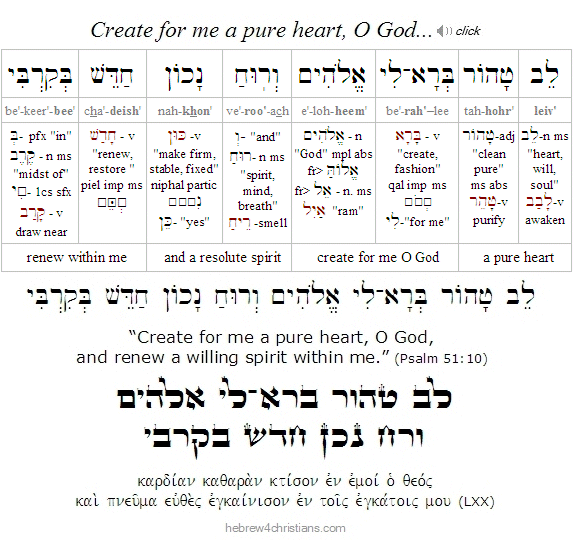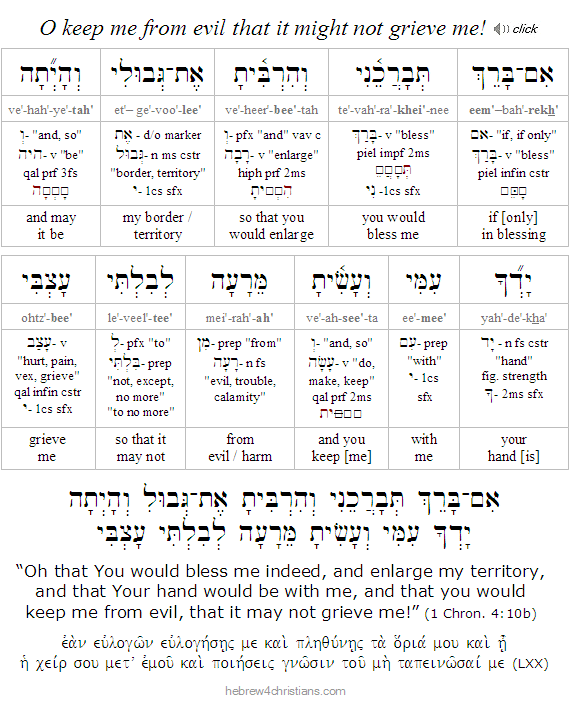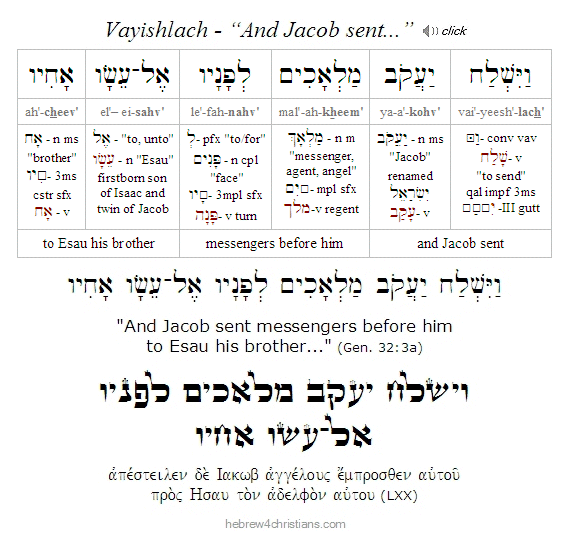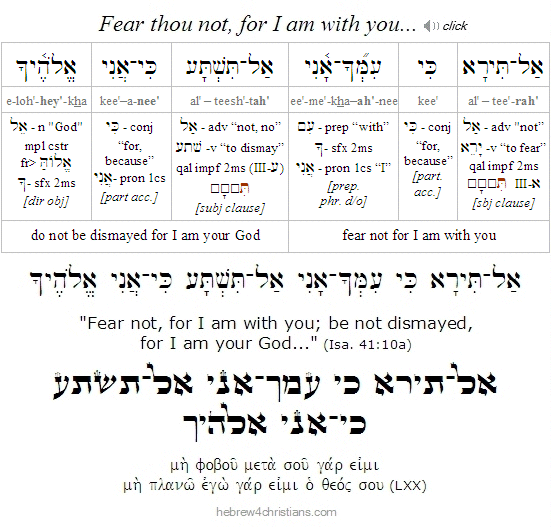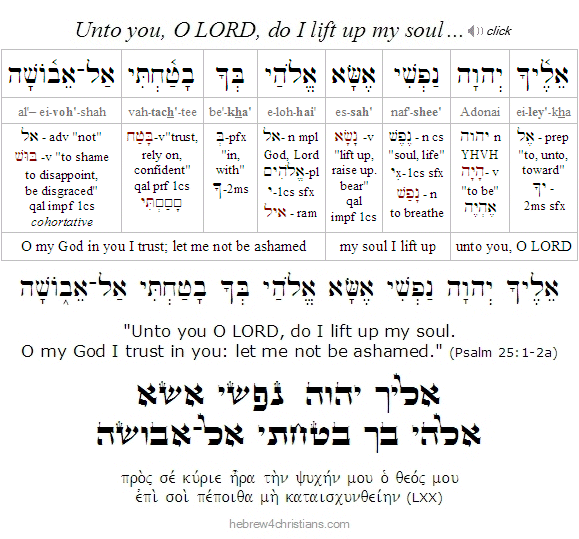|
December 2022 Updates (continued)
Note: If any page content appears to be missing, please refresh the page...
The Sigh of Faith...

[ "But we believe – nay, Lord we only hope, that one day we shall thank thee perfectly for pain and hope and all that led or drove us back into the bosom of thy love." - George MacDonald ]
12.04.22 (Kislev 10, 5783) "We groan inwardly as we eagerly await our redemption..." (Rom. 8:23). We sigh deeply because we are suspended between two worlds, living in the ambiguity of an already-not-yet expectation, enduring ourselves as imperfect vessels longing for perfection, trapped between what is and what will be, seeing the unseen, yearning for healing, believing that we shall never die, even as we die (John 11:26). We are restless for our eternal home and long for God's presence as we walk through shadowy vales, facing various temptations, whispering our prayers in the dark. And though we must learn endurance and trust in God's sovereign purposes, our faith nevertheless compels us to cry out, "How long, O Lord?" and "Come, Lord Yeshua" (Rev. 22:20). Our ongoing challenge is to keep a positive attitude despite the struggles we face, and therefore we inwardly pray: "Renew within me ruach nachon (רוּחַ נָכוֹן) - "a spirit that says Yes" (Psalm 51:10).
Hebrew Lesson:
Psalm 51:10 Hebrew reading:
Surrender means accepting God's will for our lives -- saying "yes" to his promise of love, even if we presently feel empty inside and wonder how long we can hang in there... Saying "yes" implies saying "no" to other things - no to fear, anger and doubt, for example. Tragically there are people who have given up hope for bitterness and despair. Asking the Lord to give us a spirit of "yes" is really a prayer for focus, direction, and the willingness to keep pressing on to our heavenly destiny, especially when the way seems dark and hope seems distant.
Though life is a struggle, we do not lose heart or faint, since even though the outer self is wasting away, our inner self is being renewed (i.e., ἀνακαινόω, "raised up") day by day. "For this light momentary affliction is preparing for us an eternal weight of glory beyond all comparison, as we look not to the things that are seen but to the things that are unseen. For the things that are seen are transient, but the things that are unseen are eternal. For we know that if the tent that is our earthly home is destroyed, we have a building from God, a house not made with hands, eternal in the heavens. For in this tent we groan, longing to put on our heavenly dwelling, that is, substance and reality..." (2 Cor. 4:16-5:3). Meanwhile we must endure ourselves, deal with our resistance to mortification, and ask God for the great blessing of keeping us from evil so that we are not consumed by grief....
Hebrew Lesson:
1 Chron. 4:10b Hebrew reading (prayer of Jabez):
Parashat Vayishlach...
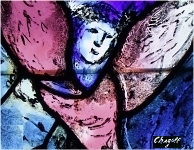
[ We always read Vayishlach a couple weeks before Chanukah when we connect the vision and ministry of Joseph with that of Yeshua, the Suffering Servant Savior of the world... ]
12.04.22 (Kislev 10, 5783) Our Torah portion this week (i.e., Vayishlach: Gen. 32:3-36:43) contains the famous account of how Jacob "wrestled" with the Angel of the LORD (מַלְאַךְ יְהוָה) just before he encountered his estranged brother Esau. During the "grappling" session (recall the meaning of Jacob's name), the Angel injured Jacob's thigh, but Jacob refused to release his hold until he received the blessing (הַבְּרָכָה). The LORD then asked him, "What is your name (מַה־שְּׁמֶךָ)?" And he said, "Jacob" (i.e., Ya'akov: יַעֲקב). The Angel then replied, "Your name shall no longer be Ya'akov (i.e., "heel holder" [of Esau]) but Yisrael (i.e., "contender with God"), for as a prince (i.e., sar: שַׂר) you have contended (i.e., sarita: שָׂרִיתָ) with God and with men and have prevailed" (Gen. 32:28). This encounter teaches that Jacob finally received the blessing when he refused to let his past determine his spiritual identity and destiny. With God's help he overcame the pain and shame of his past through faith.
Likewise each of us must "go to Peniel" to wrestle with the Angel, just as each of us must be renamed from Ya'akov ("a supplanter") to Israel ("a prince with God"). When the Spirit of Truth asks, "What is your name," may the LORD God grant you the courage to refuse to "let go" until you receive the divine blessing of love and acceptance...
The word vayishlach (וַיִּשְׁלַח) means "and he sent" (from the verb shalach, שׁלח, "to send"). The sages comment that like Jacob, each person of faith is a shaliach (שָׁלִיחַ), or an "emissary" sent out to bear witness to others of the reality and true blessing of God. And may the LORD God of Israel help you, friend, serve as an extension (שְׁלוּחָה) of His loving and gracious Presence to all you may encounter this day.... L'shavuah tov b'Yeshua Adoneinu, chaverim...
Hebrew Lesson:
Genesis 32:3a reading (click):
Dates for Chanukah 2022
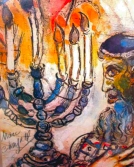
12.04.22 (Kislev 10, 5783) On the Biblical calendar the month of Kislev (כִּסְלֵו) is the ninth of the year (counting from Nisan), and also one of the "darkest," with the days progressively getting shorter and the nights getting longer. Indeed, the Winter Solstice often occurs during the last week of Kislev, and therefore the week of Chanukah (which straddles the months of Kislev and Tevet) often contains the longest night of the year. It is no wonder that, among other things, the holiday of Chanukah represents an appropriate time to kindle the lights of faith - and to remember the Light of the World in the Messiah's advent to earth...
The Hebrew word Chanukah (חֲנֻכָּה) means "dedication" and marks an eight day winter celebration that commemorates the victory of faith over the ways of speculative reason, and demonstrates the power of the miracle in the face of mere humanism. Although it is customarily observed as a "Festival of Lights," Chanukah is a "fighting holiday" -- a call to resist the oppression of this world and to exercise faith in the LORD (Rom. 13:12).
This year the eight days of Chanukah will begin on Sunday, December 18th after sundown (1st candle) and will run until Monday, December 26th until sundown. On the first night of Chanukah one flame is lit, on the second night two, and so on until the eighth night when eight flames are lit. In this way we remember the 'growth' of the miracle.
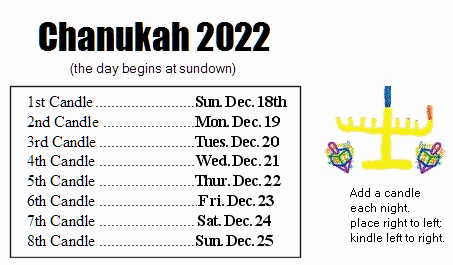 |
The Language of Pain...
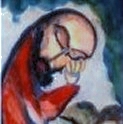
12.02.22 (Kislev 8, 5783) Regarding the "language of pain," the Talmud discusses how the bleeding of a stubbed toe corrects the relationship between man and God as if it were an "olah sacrifice" (whole burnt offering). They elaborate that this would be the case if it was the second time the toe was injured before recovering from its first injury, and that it had occurred on the right toe when the person was on a mission to perform a mitzvah.
The reference to the right toe recalls the anointing of the priest for service (Exod. 29:20) as well as the healing of a leper (Lev. 14:25). The sages note that this signification of the blood is not the result of a punitive measure but instead indicates a wound that brings the heart closer to God. In the case of an injury to the toe while doing a mitzvah, the sufferer is brought to teshuvah (repentance), not because of disobedience, but in order to learn compassion, and to affirm that everything comes only from the Lord (Psalm 136:25-26). "Let this suffering be for atonement," by which is meant, may this too bring my heart closer to God's love... The sages brought this case up as a counterexample to the notion that all suffering or pain is some form of punishment from heaven, and argue that on the contrary, some suffering is the result of God's decree. This is the message of the Book of Job as well.
A pain-free life is not necessarily a sign of blessing, of course, since it might indicate that the person is no longer being "educated for eternity," and therefore that God no longer talks to him anymore. This is one way to understand the irony of why the wicked prosper in this world, for they shall have received their reward here, but nothing in the world to come (Matt. 6:5; Job 27:8). On the other hand, pain can "goad" the soul to draw near to God for healing, which is the essential and consummate blessing, after all... Pain also teaches us to be humble, to consider our own frailty and need, and to learn compassion by extending that consciousness to people as well. The greatest example of this is found in our Savior, who emptied himself and suffered in wholehearted service to his heavenly Father (see Isa. 50:6; Phil. 2:7-8; Heb. 2:10, 4:15; 5:8-9. 7:25, etc.).
The focus of spirituality is not about finding comfort through fulfilling our desires as much as it is devotion to the truth by exercising faith in the divine ideal. We come to God to conform to his will, not because religion is a form of therapy or another self-improvement project. Stoicism has made a come-back in the "postmodern" world, offering people a variety of philosophical diversions meant to diminish the significance of what happens in this world and to direct the mind to a "nirvana-like" equanimity (ataraxia), as if the final reconciliation has already taken place. Such detachment from the world, however, is incompatible with faith in God's omnipotence and love, since it assumes that this age is not meaningful or offers no blessing. Genuine faith in God allows us to mourn when sorrow is called for and to rejoice in times of joy; it does not negate the reality of history nor deny God's providential love in the temporal realm. This is part of the tension we have in a "two-tiered" reality, which requires us to both affirm the reality of life in this world - the mixed bag of sorrows and joys we experience in our sojourn - and the promise of the substance to come, when all tears will be wiped from our eyes and our love will be unhindered by sin... The tension is dialectical and complex: we stand in relation to God not only when we are confronted by his truth, but in our seeking and in the ordinary ups and downs of our everyday existence. As C.S. Lewis said, those who choose a life of truth over happiness often acquire both, whereas those who seek happiness over truth often acquire neither... Therefore as we walk with God, whether in the high places or in the shadow of death, we experience blessing and grace in our lives.
The temptation behind suffering is to regard it as a sign of divine rejection or abandonment. Even when suffering is interpreted to be an invitation to do teshuvah, however, it does not unambiguously indicate where we stand in relation to God... This is true even in light of the work of salvation secured in Yeshua at the cross. Is our suffering a means of correction or "chastening" (Psalm 94; 119:71)? Or is it the result of the common affliction our fallen human nature (Gen. 3:17-19; Job 5:7; 14:1; Rom. 8:20)? Or is our suffering somehow for the sake of the glory of God (John 9:1-3, Matt. 5:11-12)? The writers of the New Testament repeatedly mention fiery trials and tests that would befall God's children (1 Pet. 4:12-13; Rom. 8:17; Phil. 3:10; Matt. 5:11-12; Col. 1:24; 2 Tim. 2:12).
Some have said that this ambiguity makes teshuvah impossible, for you can't repent unless you know what you have done wrong... This raises the question of how much we are able to know of ourselves and our "secret sins," and how these affect us spiritually. "The heart is deceitful above all things, and incurably sick-- who can know it" (Jer. 17:9). The heart is the source of the problem (Mark 7:21) and yet how is it possible to overcome itself? In other words, how can a person be saved from himself, after all? If we are incurably sick, healing must come from a source outside of ourselves... by means of the miracle of regeneration.
We do not relate to God in terms of the "law" but rather in personal terms, by having faith in God's love and grace given in Yeshua (Heb. 4:15-16). The problem of our sin therefore goes beyond "forensic judgment" to that of relationship... Instead of reciting a litany of our sins against heaven, we reach out for connection, for God's mercy and touch, even if we are in darkness about what went wrong or how we lost our way. How have I broken my connection with the Lord? How have I allowed myself to harden and thereby become lost to my true heart? How have I misunderstood? How have I been blind? How have I doubted God's love for me? To "renew our days as of old" we must first understand our need for renewal - for our need to "return to our first love." We return to the Lord in trust that his love is all we need, and that he welcomes us with blessing (Luke 15:11-32).
As Kierkegaard explained, the "self" is really an inner dialog within the heart (a "relation which relates itself to itself"), that is, a self-transcendent relation that witnesses the inner dialog, though we cannot have a true "self" apart from a relationship with what Buber called an "I-Thou" connection. These two relationships are eternal - the one we have with ourselves, and the one we have with God who is the ground of our existence, and therefore we cannot really exist with ourselves apart from having a right relationship with God who establishes who we are. Paradoxically, if all we have is ourselves, we do not have a self at all, and those who seek to have a self must first lose themselves to find themselves.
God's thoughts are not our thoughts nor are our ways his ways (Isa. 55:8), and there is no "recipe" or "formula" to know Him apart from the messy business of struggling within our hearts, seeking and finding, and seeking again, lamenting and praising, and then lamenting again, by living out our evanescent lives in the depths of our needs and our dearest hopes. In times of incomprehensible suffering, a heart connection with God can indeed be quite unsettling, but we must press through the fear, we must "see through the glass darkly" and confess that "God is with us" - even in the midst of this trouble. Faith apprehends God's heart before all else - it trusts that there is unseen good that transcends and constrains the travail of the present hour. Our father Jacob was renamed "Israel" when he surrendered to God's Presence despite everything wrong he had ever done...
Hebrew Lesson
Psalm 55:8 Hebrew reading (click):
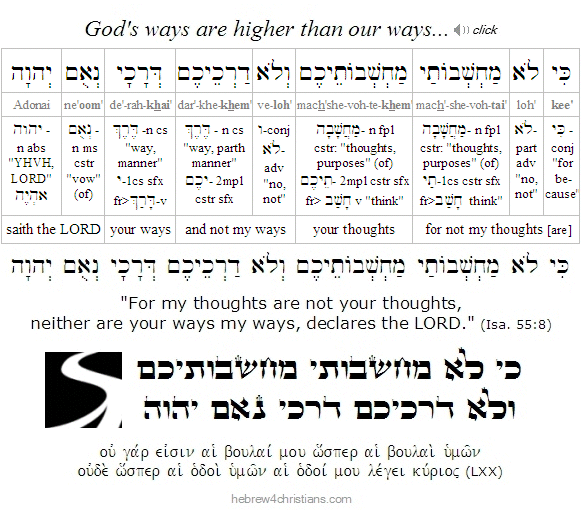 |
Faith not only affirms that God is with us in the present, however, but in the pain of our past as well. In response to the intellectual question, "Where was God in times of our sorrow, our abandonment, our nightmare?" Faith answers: "He was with us." But faith not only affirms that God was with us in the harrowing past but will be with us in the future, in the substance of our yearning for deliverance and for life. Faith "remembers the future" by holding to the promise of God, even in the wake of the past and in the ambiguity of the present...
God is involved in all our sorrows because of his greatness, and his pathos knows when "the flower fadeth and when the sparrow doth fall." As David said: "telleth our wanderings, he collects our tears and stores them in his bottle; the story is written in his book" (Psalm 56:8). The heart of the Lord spans "the breadth and length and height and depth" Messiah, a love that surpasses knowledge (Eph. 3:17-19). "It is higher than heaven-- what can you do? Deeper than Sheol -- what can you know?" (Job 11:8). Despite the sorrows and anguish we sometimes experience in this life, we trust that God will fulfill his promises to us and perfect our salvation at the appointed time. Our exile will then be over and then we will experience the consummate glories and wonders of heaven itself.
Hebrew Lesson
Job 19:25 Hebrew reading (click):
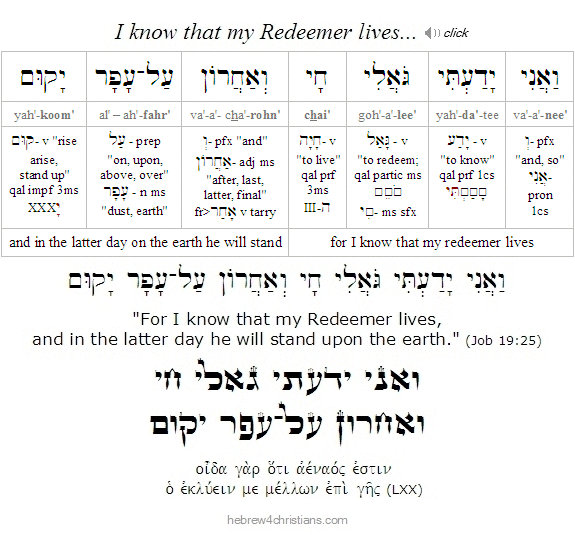 |
Victory over Fear...
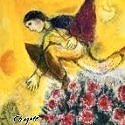
[ "Victory over fear is the first spiritual duty of man." - Nikolai Berdyaev ]
12.02.22 (Kislev 8, 5783) Most of us understand that loving God is our essential obligation, the end or "goal" of all the other commandments, the very reason why God has spoken and why we exist. Yeshua plainly taught that this was the point of "the law and the prophets," the rest being commentary (Matt. 7:12, Matt. 22:36-40). However, while love is the greatest commandment, you might be surprised to learn that the most frequent commandment is simply al-tirah, "Be not afraid." Over and over again in the Scriptures we hear the LORD saying to those who trust in Him, al tira, "be not afraid."
Of course this doesn't mean that we should pretend that evil doesn't exist or that there's no real danger in this world. No, the Scriptures are clear that such things are indeed real. There are spiritual enemies in the world and we are engaged in a genuine spiritual war. The devil walks about as a roaring lion, seeking whom he may devour (1 Pet. 5:8). But despite these things – or rather, in light of them – the Spirit says: al-tirah, "Be not afraid."
"There is no fear in perfect love," as the Apostle John wrote (1 John 4:18). If we love God because He first loved us (1 John 4:19), then we find courage because of the heart He imparts to us. This was part of the very mission of the Messiah, to "deliver all those who through fear of death were subject to lifelong slavery" (Heb. 2:15). True, we are to fear the LORD, but this does not denote a cringing terror of God's judgment but rather a reverential awe as He daily condescends to be involved in our lives.
A midrash says that the Ten Plagues were needed – not to convince Pharaoh that the LORD was God – but rather to convince the children of Israel of God's love! After all, without faith in that, Israel would never have ventured to leave Egypt. The same might be said of the greater Exodus given through the cross: the suffering of Yeshua was not only payment for sin but also the means to be recreated in God's love.
Sometimes God reveals His care for us in spectacular ways, but He always provides "hidden miracles" that uphold us every day. God didn't just create the universe and then remove Himself from its care: Yeshua is sustaining all things by the Word of His power at all times (Col. 1:17). And because of the resurrection, we live as "contemporaries" with Messiah. Living in the light of God's Presence reveals the daily bread that comes from Heaven, but those who refuse the truth find no lasting sustenance for the world to come... We all must believe that God is making miracles for us to live and grow in this age; otherwise we are living in fear.
Nachman of Breslov once is reported to have said that "The whole earth is a very narrow bridge (כָּל־הָעוֹלָם כֻּלּוֹ גֶּשֶׁר צַר מְאד), and the point of life is never to be afraid." Likewise we understand Yeshua to be the Bridge to the Father, the narrow way of passage that leads to life. He calls out to us in the storm of this world, "Take heart. It is I; be not afraid" (Matt. 14:27). When Peter answered the call and attempted to walk across the stormy waters, he lost courage and began to sink, but Yeshua immediately reached out his hand and took hold of him, saying, "O you of little faith, why did you doubt (lit., think twice)?"
We must be careful not to let the light in us become darkness (Luke 11:35). The love and acceptance of God is the answer to our fear, not the thought of being judged by Him or attempting to merit his favor through religion. God's love is our hope, and this hope gives us courage to persevere the storms of the day...
"God has not given us the spirit of fear, but of power (גְּבוּרָה / δύναμις) and of love (ἀγάπη), and of a "sound mind" (σωφρονισμός), lit. a "delivered" mind, "healed" from fragmentation (2 Tim. 1:7). The Greek word "sound mind" (σωφρονισμός) comes from the verb sodzo (σῴζω), meaning "to save," from saos (σάος) "safe," in the sense of being under restraining influence of the Spirit of God... May God help us to hear Him saying, al tira, "Be not afraid." No fear; Stay strong; walk in God's love for you...
Hebrew Lesson
Isaiah 41:10a reading (click):
Presence in Prayer...

[ God is always present. The question is, how present are we? ]
12.02.22 (Kislev 8, 5783) We often need to pray before we can pray... "Lord, teach us to pray" (Luke 11:1). The sages say that when you so pray, your focus should be so concentrated that you are ready to die during the prayer. Regard yourself as a living sacrifice (korban chai) and offer your blood, your body, your soul, your will upon the altar before God (Rom. 12:1). Say, "Lord, I offer myself to Thee, to do with me as Thou will. Relieve me of the bondage of myself, that I might do Thy will..." Ask for the Holy Spirit to breath out the words of God's heart; cleave to God as if you had ascended before the Throne of Grace. "O LORD, open my lips, and my mouth will declare your praise."
Hebrew Lesson:
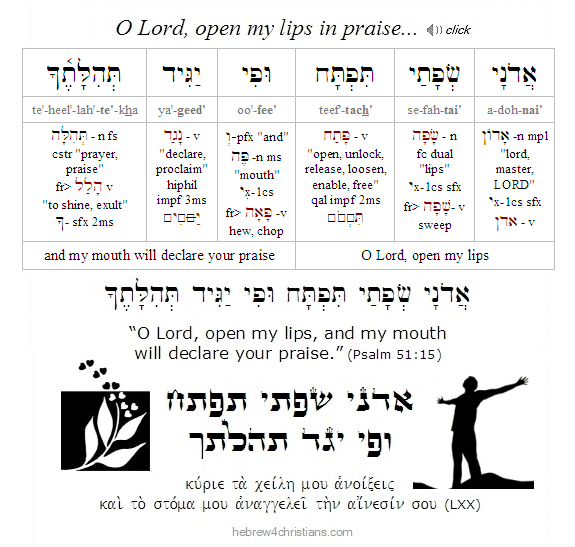 |
When we pray earnestly, from the heart, we "come to ourselves" and return to what is most essential for our lives. We offer up everything to God. As we focus on what matters most, namely our need for God, the Holy Spirit will groan on our behalf in intercession (Rom. 8:26).
God's thirst for you...

[ Sorrow for sin does not arise when you realize you have violated a law, but when you realize you have wounded the heart of your Heavenly Father by turning away from His love... ]
12.02.22 (Kislev 8, 5783) Spiritually speaking, there are two basic sorts of breaking. One is to be broken by the inevitable sin and ruin of this world, and the other is to have "lev-nishbar," a broken heart, before the LORD (2 Cor. 7:10). The former comes from the vain attempt to find life in the broken vessels of this world (Jer. 2:13), whereas the latter comes from the realization of an incurable inner emptiness (Matt. 5:4). The soul finds eternal satisfaction desiring God's righteousness, since God alone provides the vessel of "living water" we need to live (John 4:14; 7:38). We all must drink from God's fountain of life, lest we suffer spiritual dehydration and death. "All who are thirsty, come to the waters..."
Are you haunted by an inner ache for love, joy, peace, and life? "Blessed are those who hunger and thirst for righteousness, for they shall be satisfied" (Matt. 5:6). Such inner poverty is a disguised grace, and the desire for healing reveals the Spirit's invitation. Faith begins with the recognition of what we really want, since only then will we come to Yeshua for the "bread of life" and "living water." All we need is found in him, though we must reach out in faith to receive: "For without faith it is impossible to please him, for whoever would draw near to God must believe that he exists, and that he rewards those who seek him" (Heb. 11:6). God rewards those who seek him out; he answers the heart's cry; he responds to all who hope in his love and salvation. Therefore, as Yeshua said: "Ask, and it will be given to you; seek, and you will find; knock, and it will be opened to you. For everyone who asks receives, and the one who seeks finds, and to the one who knocks it will be opened" (Matt. 7:7-8). We are not saved by faith in our own faith, but in the Reality and Power of the LORD God who does the miracle of raising the dead to newness of life.
So do you have the "gift of holy desperation"? That's the very special blessing of needing God so viscerally that you otherwise will fall apart or even self-destruct apart from His ongoing intervention in your life... You pray because your very life depends on it; you believe because without God, you would be swallowed up in darkness. The fire on the altar was to be kept burning at all times (Lev. 6:12-13) symbolizing the "inner fire of the heart." How blessed it is to be full of the fire of this inner need, this relentless groaning, this constant hunger and thirst for God and his righteousness! How fortunate we are to receive daily bread from the hand of our heavenly Father. King David cried out to the LORD: "I stretch out my hands to you; my soul thirsts for you like a parched land," which (ironically) is the answer to God's own love for David, and indeed for all of us. The Lord stretches out his hands to us upon the cross; he desperately thirsts for us to return to him and to know the depths of his love...
Here is something we may overlook when we think about the relationship between the law of God in relation to his grace. Sorrow for sin does not arise when we realize we have violated a lawcode, but when once we realize how we have wounded the heart of our Heavenly Father by turning away from His love... God demonstrates his great passion for us as he stretches out his hands to us in love; he thirsts for our communion with him!
Hebrew Lesson:
Psalm 143:6 Hebrew reading:
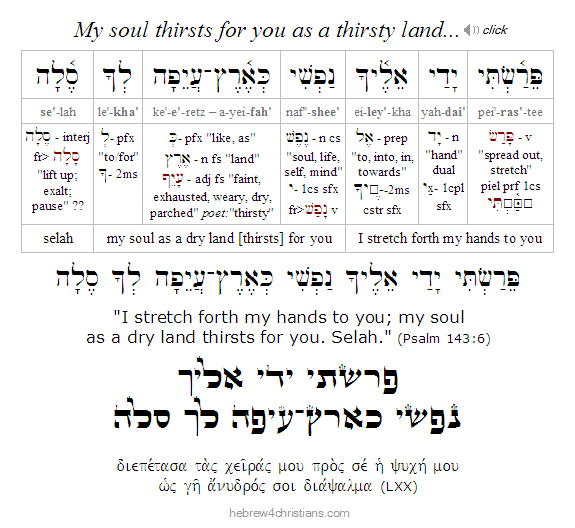 |
Comfort in Affliction...

[ "The truth, even though I cannot feel it right now, is that I am the chosen child of God, precious in God's eyes, called the Beloved from all eternity and held safe in an everlasting embrace... We must dare to opt consciously for our chosenness and not allow our emotions, feelings, or passions to seduce us into self-rejection."- Henri Nouwen ]
12.01.22 (Kislev 7, 5783) One of the ultimate tests of faith is to refuse to succumb to despair in the face of personal suffering. For those who struggle with the loss of a loved one, or some terminal disease, the test of faith calls for the heart to look beyond the realm of appearance, where the "outward man" perishes, to the realm of ultimate healing, where the "inward man" is finally liberated from the ravages of sin and death.
Our present condition is one of a "divided house" that cannot stand. The old nature is earthbound, a creature of the dust of the earth, whereas our new nature comes from the breath of life imparted through faith in Jesus. In His infinite wisdom, God has imparted the treasure of hope in "jars of clay" so we can understand that our sufficiency comes from Him alone (Psalm 119:25; 2 Cor. 4:7).
Our natural tendency is to seek comfort and to flee from pain. We fret over the insecurities of our world and instinctively seek shelter from threats we perceive. Yet the world itself is subject to vanity (Rom. 8:20); it is pain-riddled and constrained to ongoing bereavement: "All flesh is grass, and all its beauty is like the flower of the field" (Isa. 40:6). As Job said, ruach chayai (רוּחַ חַיָּי), "my life is but a breath" (Job 7:7).
God often uses suffering to do a "deep" work of change within us. Indeed, the tribulations of life are described using the image of the "squeezing of grapes," which yield something far more precious than any kind of this-worldly happiness. "For our light affliction, which is but for a moment, prepares us for a far more exceeding and eternal weight of glory" (2 Cor. 4:17).
Of course there are dark moments where pain can almost blind us to all hope. For those who know it, there are long hours where there seems no respite or consolation from affliction. But genuine faith affirms with Job that, "though He slay me, yet will I trust in Him" (Job 13:15). This is comfort we have in affliction: God's promise revives our hearts to say, "I know that my Redeemer lives, and at the last he will stand upon the earth" (Job 19:25). Even in the "shadow of the valley of death" (i.e., this moribund and broken world), the LORD is with us and comforts us with His Presence (Psalm 23:4).
Hebrew Lesson
Psalm 119:50 Hebrew reading:
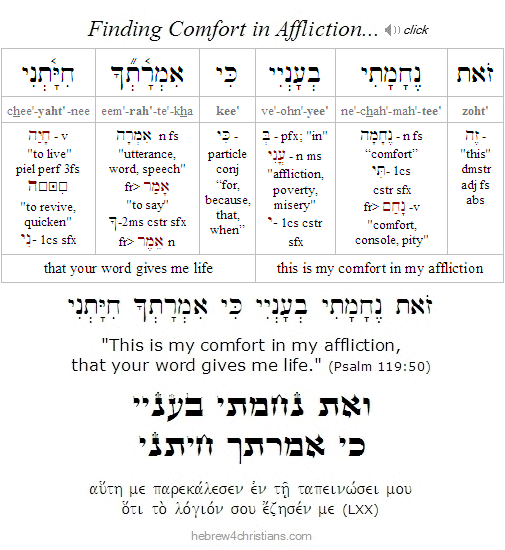 |
Salvation and Sanity...

12.01.22 (Kislev 7, 5783) It is written in our Scriptures (2 Tim. 1:7) that "God has not given us a spirit of fear (πνεῦμα δειλίας), but of power, and love, and a sound mind." Note that the Greek word for "sound mind" (σωφρονισμός) comes from a verb (i.e., sodzo: σῴζω) that means being made "safe" (i.e., soas: σωός) or healed because of the power and grace of the Living God. Understand, then, the connection between fear and confusion, and note further the connection between having a sound mind and a heart of peace and courage. "The work of righteousness shall be peace; and the service of righteousness shall bequietness and confidence for ever (Isa. 32:17). A fearful or shameful attitude (פַּחדָנוּת), then, weakens your resolve, quells your love, and introduces pain to your thinking. It is the old trick of the enemy of our souls to lead us unto despair, the exile of shame, and cruel bondage to untruth. As always the answer is the same: namely, teshuvah, turning to God and embracing the grace and love given in Yeshua as our deepest reality, our power, our heart, and our mind.
The Name of the LORD (יהוה) means "Presence" and "Love" (Exod. 3:14; 34:6-7). Yeshua said, "I go to prepare a place for you," which means that his presence and love are waiting for you in whatever lies ahead (John 14:1-3; Rom. 8:35-39). To worry is to "practice the absence" of God instead of practicing His Presence... Trust the word of the Holy Spirit: "For I know the plans I have for you, declares the LORD, plans for healing peace and not for evil, to give you a future and a hope (Jer. 29:11). Chazak ve'ematz, chaverim!
Take comfort that your Heavenly Father sees when the sparrow falls; he arrays the flower in its hidden valley; and he calls each star by name. More importantly, the Lord sees you and understands your struggle with fear... Come to him with your needy heart and trust him to deliver you from the burdens of your soul (Matt. 11:28).
Hebrew Lesson
Psalm 25:1-2a reading (click):
<< Return
|








